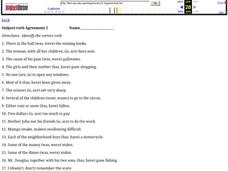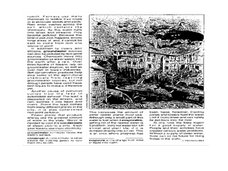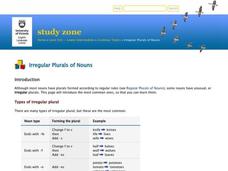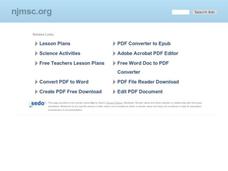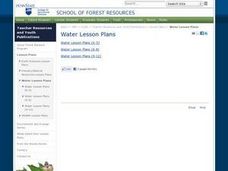Curated OER
What Can You Do?
Learners explore reasons for the destruction of the wetlands and identify ways people can help protect them. They create and design a wetlands conservation poster to be presented to the class.
Curated OER
California Indians
Fourth graders discuss the major nations of California Indians, their geographic distribution, economic activities, legends and religious beliefs. They describe the function of Spanish missions and the influence of Catholicism. In...
Curated OER
What is an Animal?
In this animal worksheet, students review various characteristics that are associated with animals including body plan and skeletal structure. This worksheet has 11 fill in the blank questions.
Curated OER
Subject-verb Agreement 2
In this grammar worksheet, students choose the appropriate verb in parentheses that completes twenty-three sentences grammatically correct.
Curated OER
Language Arts- Parts of Speech: Sorting Nouns and Verbs
In this grammar activity, students cut out the word cards and glue them under the noun heading if they are nouns, and the verb heading if they are verbs. There are 20 words to sort through.
Curated OER
Protecting Your Eyes
In this eye protection worksheet, students discover how to protect their eyes as they read guidelines and then respond to 3 questions regarding the information.
Curated OER
Creeping and Crawling Observing Mealworms and Earthworms
Fifth graders observe mealworms and earthworms. In this mealworm and earthworm lesson, 5th graders complete an experiment in which they observe the life cycle and living conditions of mealworms and earthworms. They experiment with...
Curated OER
The Art and Soul of the Land
Students study conservation and how different communication styles used by different conservationists. In this conservation lesson students obtain information on a cartoon or a few quotes from a conservationist and are ask to describe...
Curated OER
Field Trip - Marine Science Institute
Students discover the ocean life of the San Francisco Bay. In this ocean lesson, students take a Discovery Voyage of the Bay ecosystem through the Marine Science Institute. Also available are inland voyages, ocean labs, and tidepool...
Curated OER
Why is Rice Good for Us?
Third graders explore why rice is good for our bodies. In this nourishment lesson, 3rd graders review the food pyramid and discuss serving sizes. Students discuss the different ways rice is used in food. Students use uncooked rice to...
Curated OER
Irregular Plurals of Nouns
In this irregular plurals worksheet, students read the chart for how to form and use irregular plurals of nouns. Students read 8 different ways to use irregular plurals.
Curated OER
Christian sentences
In this Christian sentences worksheet, learners choose the correct word to complete the sentences about Christianity. Students complete 10 multiple choice questions.
Curated OER
Ivy Bean
In this Ivy Bean worksheet, students read about the life of the oldest woman using social networking, then complete a variety of comprehension activities. An answer key is included.
Curated OER
Local Environmental Issues: Pollution
Third graders discuss the ways in which human interaction with the environment and production of waste products contribute to pollution. Through a pollution demonstration, they explain how various groups of plants and animals can be...
Curated OER
Pirate PE Field Day
Students participate in movement activities while completing "pirate" stations. They rotate through the activities every 6-7 minutes. They complete activities such as "Walk the Plank, Gone Fishin', Cannon Blast, and Swab the Deck."
Curated OER
Learning Lesson: That Sinking Feeling
Students discover the origin of the Great Ocean Conveyor. They participate in a demonstration showing how salinity and temperature affect water density. They also examine the new sea ice that forms every winter.
Curated OER
"Pennsylvania Watersheds, Many Ways to the Sea"
Students trace a molecule of water through the water cycle including each of its three loops. They describe why evapotranspiration demands the largest portion of total precipitation falling on a forested watershed.
Curated OER
Eeeee -- It's a Mouse!
Pupils recognize the long "e" sound, and identify it in spoken words by learning letter symbols. Students participate in role playing and tongue twisters to learn the long "e" sound. By learning phenomes, pupils are taking the first...
Curated OER
Think Green
Students experience and practice compositing and recycling through hands-on-activities. They distinguish between which items from their trash can be recycled, composted and reused. The process for making recycled paper is also covered in...
Curated OER
Edible Health
Young scholars construct an 'edible' map of the respiratory system using different foods. They follow along with the teacher and place foods on their map to symbolize the different parts (licorice to represent the trachea). They eat...
Curated OER
Science: Dissolved Oxygen and Water Quality Sampling
Students perform tests to determine the level of oxygen dissolved in water. After examining a table displaying the temperature and solubility of water, they examine the three stages involved in the test. Upon completion, students explain...
Curated OER
Cracking Sticks
Students explore the letter /k/ in this lesson, and identify the /k/ sound in words. They read a tongue twister emphasizing the /k/ sound, and discuss that two letters make the /k/ sound - c and k. They then practice writing k's and...
Curated OER
Making Waves, Making Music, Making Noise
Sixth graders watch a demonstration on how talking cans produce sounds. In groups, they compare and contrast the sounds from different sized cans. They participate in a variety of activities to discover how sounds are made and how...





